Mushrooms represent a largely unexplored world
especially in the Western hemisphere. They are not considered a plant
because they don't undergo photosynthesis. They are a fungus. When it
comes to fungi, there are over 5,000 different species in North America
alone and many of them are wildly popular in the culinary world.
Several Eastern cultures have long recognized mushrooms for
their health promoting attributes.* Over the last fifty years,
scientists again, mostly in the Eastern world have finally begun to
validate their many potential health benefits. Over 300 different species of mushrooms are now thought to have potential for promoting health.* Evidence continues to emerge, confirming how mushrooms’ proteins, trace minerals, polysaccharides, amino acids and fiber promote overall heath.*
These and other compounds found in mushrooms are now believed to help…
- Support immune function*
- Promote normal cellular growth*
- Protect against environmental stressors*
- Support your body’s normal detoxification process*
- Preserve cellular structure*
- Support healthy gut flora*
- Promote optimal digestion*
A Mushroom Is More than What Meets the Eye
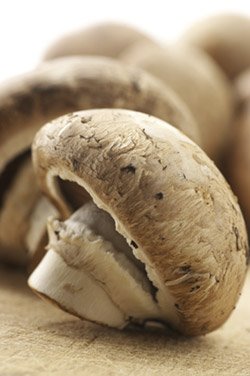
Mushrooms are more than a stem and cap
However, there's much more to a mushroom. What you and I consider a mushroom is actually the fruiting body of a much larger mass called "mycelium".
The mycelium is the part of the mushroom you don't see or typically eat. It's the hidden part of the fungus and up to 95% of mushrooms' total biomass that lies beneath the surface of the soil.
Mycelium is a vast network of living cells covering much of the earth's surface. And when I say "vast", I'm not exaggerating.
More than 8 miles of these individual mycelium cells, called mycelia, can permeate ONE cubic inch of soil! And as the largest biological entities on the planet, these “fungal mats” can live for decades and even centuries.
Here’s an important point I want you to hold on to… During its life, the mycelium has one goal: To preserve and promote the existence of the species.
Mushroom or mycelium cells struggle to survive against invaders. In order to survive, mycelia have developed highly efficient and proactive immune systems.
Many scientists now believe that the highly developed immune system, the mycelia, has evolved over the years, along with its ability to break down organic matter in nature, are exactly what makes mushrooms so valuable to humans and other mammals.
To get a better understanding of how the mycelium promotes and preserves its species and what that can mean for us, let’s take a closer look at its life cycle.
Here’s a detailed look at the complete life cycle of the mycelium – and the mushroom:
The Life Cycle of the Mushroom
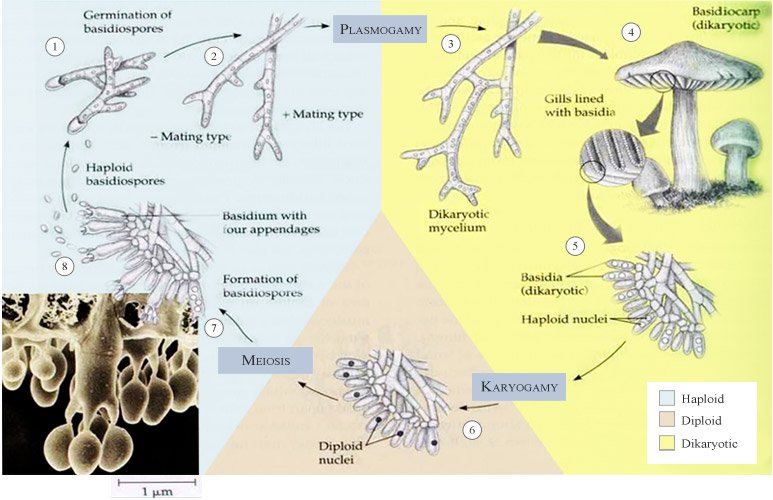
The diagram starts when the mature mushroom releases its spores (#1
in the upper left corner). These released spores germinate in an
environment that promotes growth. It can be soil, plant matter, or other
substrate.
Keep in mind everything is happening underground until step #4. Environmental conditions such as rain and warm temperatures encourage the mycelium to form compact masses that develop into “fruit” – mushrooms – that can literally pop up overnight.
In short, the mycelium achieves it goal of promoting its species by growing mushrooms. These mycelium “fruit” produce spores in their cap’s underside gills.
The spores rapidly multiply and by the time the mushrooms reach adulthood of their short lifespan, their gills release spores into the air and soil. After releasing their spores, mushroom fruit bodies decompose quickly, often within a day. The life cycle then repeats itself.
What you may not appreciate from this rather complex diagram is the enormity of the process.
Growing at the rate of one quarter to two inches per day, imagine the growth of the mycelial mass from just a single mushroom species. Every inch of soil hosts thousands of species of fungi.
Just more evidence of the power of the mycelium and its ability to promote the life of the species – this time through genetic diversity.
Making Mushrooms or Mycelium Work For You
As I mentioned earlier, other cultures have valued mushrooms for their health-supporting properties for five millennia and science is now starting to validate many of those claims.*What is it about mushrooms that makes them so potentially valuable to your health?*
Beta glucans and proteoglycans are the primary biologically active compounds in mushroom fruit bodies and mycelia that support the immune systems of humans, and some animals, too.* Beta glucans are chains of polysaccharides, and proteoglycans are special proteins, often found in connective tissue.
And what makes mushroom-derived beta glucans so valuable to human health is this - their ability to help support the immune system.* And that may offer value to individuals who desire to support optimal immune function without over-stimulation. *
How do mushrooms support immune function?

Beta glucans function like a lock and key
Just like a key and lock, the beta glucan compounds in mushrooms must “fit” perfectly with cellular receptor sites to support the immune system.*
By binding to receptor points on cells important to the immune system, the beta glucan polysaccharide compounds can have a positive effect on your immune cells.*
Each individual mushroom species contributes a variety of beta glucan molecular structures. When you combine several species, you multiply the number of immune cell receptor sites that may be activated.
While beta glucans have been the most studied component, mushrooms contain many other bioactive compounds and proteins that support immune function, too:*
- Alpha glucans
- Antioxidants
- Enzymes
- Pectins
- Ribonucleases
- Ubiquitin-like proteins
- Peptides
- Lectins
How Mushrooms Support a Healthy Gut and Digestion, Too*
Supporting healthy immune function isn't the only thing mushrooms can potentially do for you.*Mushrooms’ complex nutritional matrix of nutrients, dietary fiber and fungal enzymes has been shown to support healthy digestion and gastrointestinal tract function.*
Mushrooms that include the extra-cellular digestive enzymes produced by the mycelium are a source of a variety of enzymes that can help promote optimal digestive function.*
And as you’ll soon see, how a mushroom is processed affects its contribution to your
health, too.*
Produced using fermentation, specially processed mushroom preparations can help promote optimal digestive function and more.*
The Connection Between Your Gut, Brain, and Immune Function

A healthy immune system starts in your gut
And when you have a healthy digestive system, you can more completely digest food particles that might otherwise keep you from enjoying optimal health.
Most people don’t realize that 80 percent of your immune system lies in your gastrointestinal tract.
So, in my opinion, if you want to help support your immune system, you must support your digestion.
Not only that, but additionally, your gut originates from the same type of tissue as your brain.
When a fetus develops, one part of this “brain” tissue
turns into his central nervous system and the other part develops into his enteric nervous system.
These two systems are connected via the vagus nerve, the tenth cranial nerve that runs from your brain stem down to your abdomen.
This nerve explains why your gut and your brain influence each other so powerfully.
And that explains why your intestinal health can affect your mental and neurological health. Including fermented products into your daily diet is an effective way to naturally help optimize your gut flora and support your immune system and brain health, too.*
Mushrooms... A Timely Addition to the
Mercola Line of Quality Supplements
With all the latest research on the benefits of fermented foods, I
am constantly searching for ways to make it easier for you to include
fermented products into your diet each day.Especially since I know not everyone is willing to regularly eat the few true fermented foods that do exist, such as natto, kim chee, and sauerkraut. (For a more complete list of fermented foods, see box at right.)
I have located a source of mushrooms that, in my opinion, offers the ultimate in mycelium benefits and is a fermented product.
Before I tell you more about the mushroom varieties included in my Immune Support* Organic Mushroom Complex, let me introduce you to the extraordinary company we’ve selected to produce our unique blend.
The company, Mushroom Matrix (M2), led by an expert team of Mycologists, has worked with mushroom species from around the world since the 1980’s.
Pioneers in the field, they developed the proprietary Solid State Fermentation (SSF) production methodology and equipment that allows for the production of health-supporting mushrooms on organic substrate (more about that in just a minute).*
M2 obtained 100% organic certification status for all of their products in 2006, and
today produce only certified organic mushrooms in their labs in San Marcos, California, just north of San Diego.
And now I’m thrilled to announce that they’ve agreed to develop a proprietary blend just for us, available only through Mercola.com.
7 Species That Made The Cut for the
New Immune Support* Organic Mushroom Complex...
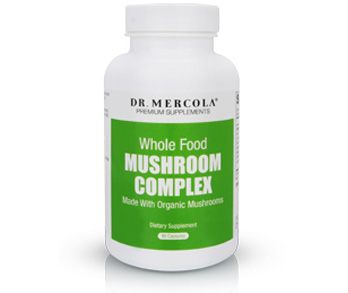 M2 selected seven species for the new proprietary Immune Support* Organic Mushroom Complex, based on their expert research of purported health benefits:*
M2 selected seven species for the new proprietary Immune Support* Organic Mushroom Complex, based on their expert research of purported health benefits:*
- Niu-Chang (Antrodia camphorata)
- Shiitake (Lentinula edodes)
- Reishi (Ganoderma lucidum)
- Maitake (Grifola frondosa)
- Turkey Tail (Trametes versicolor)
- Himematsutake (Agaricus blazei)
- Cordyceps (Cordyceps militaris)
Niu-Chang A Rare Gift Originating From Taiwan’s Old-Growth Rainforest

The Mountains of Taiwan - Home to
Antrodia in the wild
In the wild, this orange-red mushroom grows inside the hollow trunk of one specific kind of tree named “Chang tree” (or the “Cinnamomum kanehirai”), found exclusively in Taiwan’s mountain regions.
Only mature Chang trees over 100 years old provide the right conditions for Antrodia to grow. Considered “Taiwan’s National Treasure”, Antrodia, in the wild is found nowhere else in the world.
Luckily for us, M2 has figured out how to culture Antrodia mycelia in its lab in San Marcos, California.
Antrodia is not only one of the world’s most rare and expensive mushrooms, it’s said to possess an impressive array of health-promoting attributes.*
Both the fruit bodies and the mycelia have been shown by research studies to contain powerful, bio-active compounds.*
Some of the scientifically studied uses of Antrodia include:
- Supports immune function*
- Promotes normal cellular function and growth*
- Supports liver health*
- Promotes healthy blood circulation*
- Promotes healthy blood pressure levels already in the normal range*
- Helps support optimal gastrointestinal health and function*
- Promotes normal immune response*
- Helps supports optimal neurological health*
From Virtually Unknown to One of the Best Known
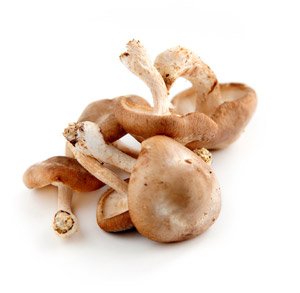
Asian Shitake Mushrooms
But did you know that both the fruit body and mycelium of the shitake are also highly valued in Asian cultures for their supposed health-promoting benefits?*
Cultivation of this mushroom has been practiced for over one thousand years.
The use of Shiitake dates back to at least 100 AD in China. In Traditional Chinese Practice, Shiitake was used to support a wide range of body functions.*
In vitro and animal research shows shitake to be useful for helping to:
- Support immune function*
- Support normal cellular growth and development*
- Support liver function*
- Promote optimal blood circulation*
- Support oral health*
- Promote healthy cholesterol levels already in the normal range*
- Promote normal response to stress as an “adaptogenic”*
The Oriental Mushroom with the Longest Recorded History of Use
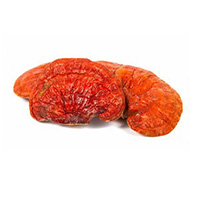
Woody, earthy Reishi Mushroom
Reishi is considered a “warming” ingredient in Traditional Chinese practice.*
Known as a “three treasure” herb, it’s thought by the Chinese to harmonize jung (life force), qi (energy), and shen (spirit).*
A richly colored mushroom, Reishi is found in the wild around the world, especially in subtropical regions. For our formula, M2 has developed a way to culture Reishi in its lab in San Marcos, California.
Active compounds are found in its fruit bodies, spores, and mycelia. Studies, including animal studies, suggest that they help:
- Support immune function*
- Support normal cellular growth and development*
- Promote the body’s normal detoxification processes*
- Support healthy blood pressure levels already in the normal range*
- Support liver and kidney function*
- Promote restful sleep*
- Help support optimal cellular energy*
- Support healthy blood sugar levels already in the normal range*
- Promote normal response to stress as an “adaptogenic”*
- Support muscular and joint comfort and movement*
- Help support optimal neurological and psychiatric health*
- Promote optimal blood flow and healthy heart muscle function*
The “Dancing Butterfly Mushroom” A Culinary Delight
and Provides Beta-Glucans, Too
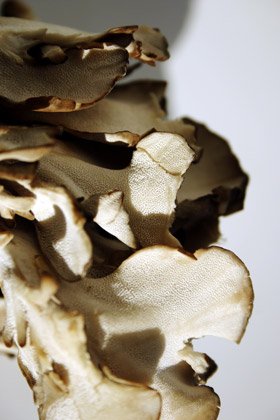
"Dancing Butterfly" Maitake
The fruit bodies and mycelia of Maitake provide immune-supporting beta glucans.* Compared to extracted fractions of Maitake, the whole powdered fruit body and mycelium show a wider variety of benefits.*
The synergistic chemistry of Maitake’s complex variety of polysaccharides, amino acids, proteins, enzymes and antioxidants contribute to its many suggested health-promoting benefits, including*:
- Supports immune function*
- Supports normal cellular development*
- May promote healthy glucose levels already in the normal range, as well as a normal insulin response*
- May help support weight management when combined with a healthy diet and exercise*
- May promote healthy blood pressure levels already in the normal range*
- May promote skin health*
The Turkey Tail One of the Most Researched and Respected...
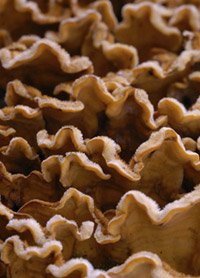
Can you see the Turkey Tail?
And it also happens to have one of the longest histories of health-promoting use in China and Japan.*
Known for its supply of a particular type of polysaccharide PSK Turkey Tail has been widely studied. Some of its purported benefits include:
- Promotes respiratory health*
- May support urinary and digestive health*
- Supports immune health*
- Supports normal cellular growth*
Looks Like a Common Mushroom, But Is It Really?
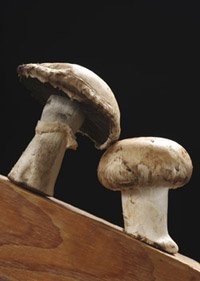
Agaricus Mushrooms
Richly almond scented, Agaricus boasts immune-supporting polysaccharides and other important cellular growth-supporting compounds, clearly setting it apart from its every day cousin.*
Other possible benefits attributed to Agaricus, in addition to supporting immune health and normal cell growth, include: *
- Helps promote optimal insulin response*
- Supports heart health*
- Supports liver health*
- Promotes optimal gastrointestinal health*
One of the Most Valued Herbs Used Traditionally in China...
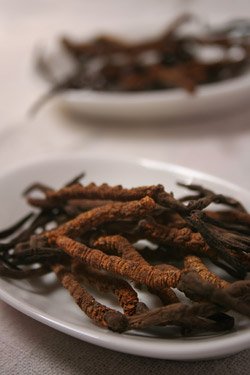
Dried Cordyceps Mushrooms
Looking the least like a mushroom, long, slender Cordyceps fruit bodies and its mycelia both show important health-promoting properties.*
Compared to Cordyceps sinensis, researchers have found the mycelia of this variety of Cordyceps to provide additional bioactive ingredients.
Cordyceps militaris has been shown in studies, to potentially help:
- Support athletic performance and energy*
- Support sexual function*
- Promote optimal circulation*
- Promote lung and respiratory health*
- Support kidney health*
- Support immune function*
- Support healthy cholesterol levels already in the normal range*
No comments:
Post a Comment